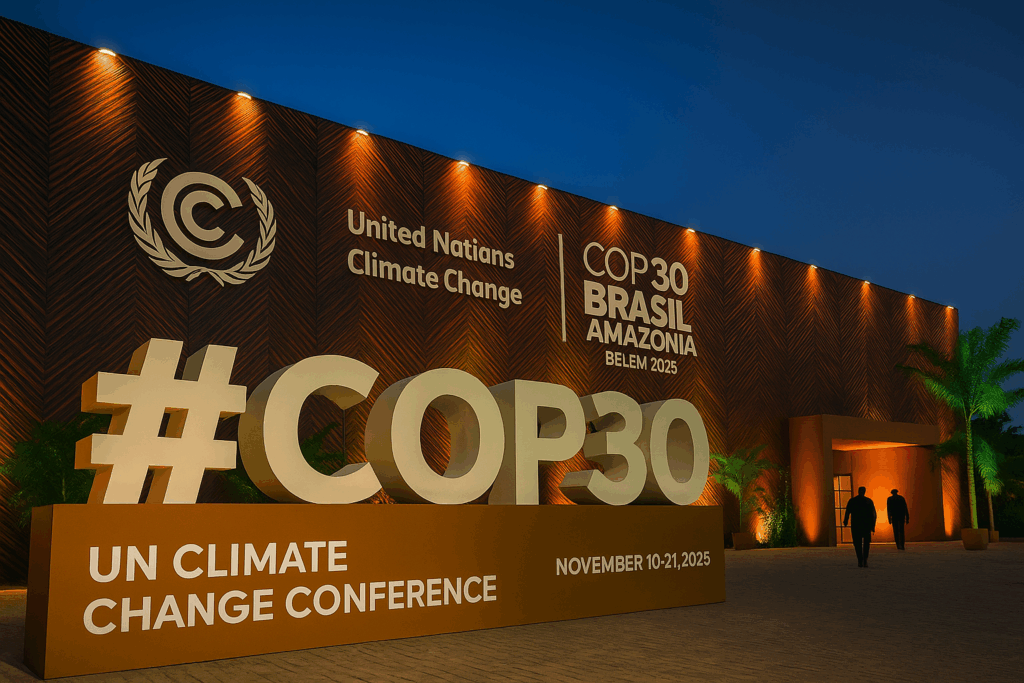Friedrich Merz stands on the stage at COP30 in Belém, Brazil. While delegations discuss climate goals, Germany is experiencing a gradual decline in its industry. Climate policy resembles a staged event more than a strategy, as the growing deindustrialization reveals the consequences of excessive subsidies. The Chancellor presents his country as a role model, even though its economic foundation is crumbling.
COP30 and the Contradictions of German Climate Policy
For decades, the climate conference has served as a stage for moralizing speeches and costly symbolic gestures. Tens of thousands travel there to “reduce” CO₂ emissions while emitting gigantic quantities themselves. The contradiction is blatant, yet the ritual continues. The self-proclaimed saviors of the world speak of responsibility while the economy suffers. Merz uses the platform to talk about transformation, but the reality in Germany tells a different story.

In reality, the rhetoric merely masks the economic decline. The loss of hundreds of thousands of industrial jobs demonstrates where the environmental agenda has led. Energy prices are rising, investments are falling, and ever-increasing subsidies are intended to conceal the crisis.
Deindustrialization as a side effect of climate goals
Deindustrialization is progressing, driven by bureaucracy and expensive energy. Entire industries are relocating because production in Germany is hardly profitable anymore. Ironically, the country is thus fulfilling its climate pledges – through economic retreat instead of innovation.
UN Secretary-General António Guterres calls for “radical action” at COP30. But German companies have already taken action – by relocating production to Eastern Europe and Asia. The former export powerhouse is in danger of becoming an industrial ailment.
Merz between aspiration and reality
Despite his cautionary words, the Chancellor remains on course. He speaks of responsibility, but his policies cling to the old dogma. The ban on combustion engines, the heating law, and high electricity prices are burdening both businesses and citizens. Instead of competition, government intervention and subsidies dominate, causing more harm than good.
Climate policy, in particular, is losing credibility. COP30 shows that international unity is often just a facade. While Europe is focusing on austerity, China and India are investing in energy diversification – coal, nuclear power, and solar energy simultaneously. These countries are acting pragmatically, not ideologically.
The Future of the European Environmental Agenda
The EU plans to allocate around €750 billion in subsidies for new climate projects between 2028 and 2034. But this redistribution hardly strengthens the climate; instead, it primarily benefits those who depend on it. The climate conference in Brazil illustrates the old pattern: grand pronouncements, little impact.
Merz knows that economic strength and environmental protection don’t have to be mutually exclusive. But as long as Brussels pushes through its environmental agenda, Germany remains trapped in a costly vicious cycle. Industrial decline replaces progress, and innovation becomes ideology.
Conclusion: Symbolic politics at the expense of substance
COP30 exemplifies a policy that prioritizes headlines over solutions. The Chancellor is defending a strategy that weakens the country, while competitors emerge stronger from the transformation.
Germany is losing industrial strength because ideology trumps reason. Deindustrialization is progressing, and with it, economic sovereignty is dwindling. The climate conference in Belém thus leaves a clear picture: Europe pays, others profit. (KOB)
